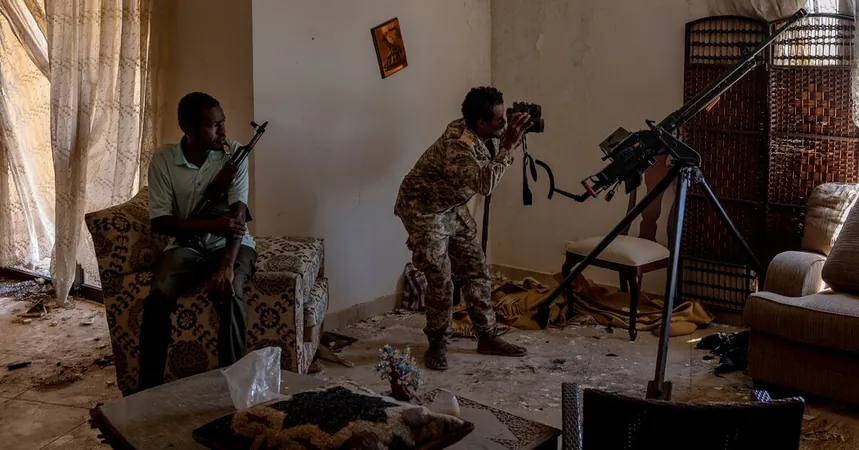
Breaking News: Sudan's Army Reclaims Presidential Palace Amid Ongoing Civil War!
2025-03-21
Author: Ken Lee
Sudan's Army Retakes Presidential Palace
In a dramatic twist in Sudan’s devastating civil war, the Sudanese military has successfully retaken the presidential palace in Khartoum early Friday morning. This critical development marks a potential turning point as the conflict, now nearing its third year, continues to ravage the capital.
Footage shared on social media captures the jubilant soldiers celebrating at the palace's entrance, which provides a striking view of the Nile River. “We’re inside!” exclaimed one officer as cheers erupted among the troops. The retaking of the palace signifies a significant morale boost for the military, which had lost most of Khartoum to the Rapid Support Forces (RSF) early in the conflict that erupted in April 2023.
Military's Renewed Offensive Against RSF
The military's renewed push against the RSF comes six months into a counteroffensive that has shifted the tides of the war in the eastern regions of Sudan. Recent days saw intense confrontations as the military executed a successful ambush against RSF convoys, creating an opening for the final assault on the palace.
Despite RSF leader Lt. Gen. Mohamed Hamdan's insistence that his forces would hold their ground, the military's relentless campaign has paid off. Allied militias, ranging from seasoned fighters from Darfur to members of the civilian-led revolution that ousted former President Omar Hassan al-Bashir in 2019, joined in the celebration.
Tragedy Amidst Victory
However, the victory was overshadowed by tragedy as an RSF missile struck a crew from Sudan’s state television station outside the palace, tragically killing two journalists and a driver, highlighting the brutal realities of the ongoing conflict.
The Power Struggle and Its Consequences
The war ignited from a bitter power struggle between military chief Gen. Abdul Fattah al-Burhan and RSF leader Hamdan, culminating in a mutual coup in 2021 that left their respective forces at loggerheads. Initially, the RSF had the upper hand, bolstered by foreign support from nations like the UAE and mercenaries from Russia’s Wagner Group. Yet, the military's recent strategic victories have shifted controls across larger parts of the capital and the southeastern states.
Khartoum's Historical Context
Khartoum’s rich history resonates profoundly within the presidential palace, established under Ottoman-Egyptian rule in the 19th century and enduring multiple reconstructions. The newly built palace, opened in 2015, has been embroiled in significant political turmoil post-2019, reflecting the turbulence of Sudan’s governance.
The Human Toll of Conflict
As the dust settles from the fierce battles of recent weeks, the devastation left behind in the urban landscape is stark. Entire neighborhoods in Khartoum are now mere shells of their former selves, with reports of mass destruction—including burnt-out vehicles and looted buildings—serving as a somber reminder of the war's toll on civilians.
Estimates suggest that Khartoum’s prewar population of approximately 8 million has dwindled to around 2 million. As military forces recapture areas, displaced citizens are being moved to temporary camps outside the city. Those remaining live in fear, recalling harrowing tales of RSF extortion and violence against those unable to pay for their safety.
The Ongoing Conflict and Future Implications
Despite the military's successes, analysts warn that even with RSF forces driven from Khartoum, the broader conflict is far from over. The original feud between the two generals has spiraled into a more extensive civil war, fueled by various foreign interests, with many parts of the city still experiencing sporadic violence.
While Khartoum grapples with its grim realities, the neighboring region of Omdurman, freshly liberated, has seen signs of normalcy return. Markets bustle, and businesses begin to reopen, offering a glimmer of hope amid the chaos.
A Call for Resolution
Yet, the horrors of conflict linger, as demonstrated by a recent RSF rocket attack that claimed the lives of several civilians gathered in a peaceful setting. The ongoing struggle casts a long shadow over Sudan’s future, emphasizing the need for a comprehensive resolution to this dire humanitarian crisis. As the events unfold, the world watches closely—witnessing the resilience of a nation caught in the throes of turmoil.




 Brasil (PT)
Brasil (PT)
 Canada (EN)
Canada (EN)
 Chile (ES)
Chile (ES)
 Česko (CS)
Česko (CS)
 대한민국 (KO)
대한민국 (KO)
 España (ES)
España (ES)
 France (FR)
France (FR)
 Hong Kong (EN)
Hong Kong (EN)
 Italia (IT)
Italia (IT)
 日本 (JA)
日本 (JA)
 Magyarország (HU)
Magyarország (HU)
 Norge (NO)
Norge (NO)
 Polska (PL)
Polska (PL)
 Schweiz (DE)
Schweiz (DE)
 Singapore (EN)
Singapore (EN)
 Sverige (SV)
Sverige (SV)
 Suomi (FI)
Suomi (FI)
 Türkiye (TR)
Türkiye (TR)
 الإمارات العربية المتحدة (AR)
الإمارات العربية المتحدة (AR)